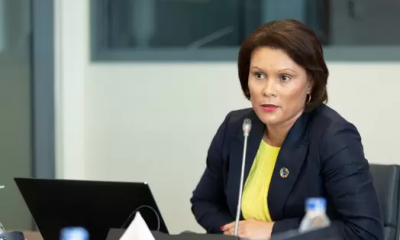CEO Insights
Sustainable Tourism Development In Africa: Interview With Thomas Müller, CEO, rainmaker

Thomas Müller is an entrepreneur with more than 37 years of experience in IT and more than 16 years in digital marketing and technology in the global hospitality and tourism industry. In this exclusive interview, he shares his thoughts with Alaba Ayinuola of Business Africa Online on the state of sustainable tourism development in Africa, the role marketing and branding play in facilitating sustainable tourism, the impact of his company, rainmaker in Africa and more. Excerpts.
Alaba: Could you tell us about rainmaker digital and the gap it’s filling?
Thomas: rainmaker has been created as a social enterprise and as such is focused on the impact we can create for destinations, for their hospitality and tourism businesses and people. It is our passion to change the hospitality and tourism sector to keep more tourism spend in the destination through the democratization of technology which we make inclusively and pervasively available to all emerging, small, medium and independent hospitality and tourism businesses. With this, the destination and their hospitality and tourism businesses take back control of their visibility, digital presence, reputation, marketing communication, and distribution.
Together with Tourism Authorities and Hospitality and Tourism Associations we create a public-private partnership, create local capacity and create a digital transformation initiative, aligned to the UNWTO digital transformation strategy and contributing to the Sustainability Goals.
Alaba: What attracted you to sustainable tourism development in Africa?
Thomas: I have got my “Africa-Virus” already in 1984 when I traveled to Kenya. When I was working with Thomas Cook in the early 2000’s I spend quite some time in Senegal. However, for 10 years I am now living in Namibia and am very active in the Southern African and Pan-African Travel, Tourism, and Hospitality industry.
I have realized that in the last 5 years the world has dramatically change to the disadvantage of the destinations and their hospitality and tourism businesses and therefore for its people. One major result of tourism is to contribute to the sustainable development of the destination and its people. However, the way things have developed worried me.
Traditional value chains are no longer sustainable as only 50% of the potential traveler makes use of a high street travel agent and therefore the traditional value chain of a travel agent – wholesale operator – DMC inbound tour operator. At the same time, hundreds of digital platforms have been created. With this a duopoly of the booking holdings and Expedia group has been established, two companies with about 40+ brands now dominating the market.
At the same time, I saw the hospitality and tourism businesses suffer from the overwhelming complexity and the increasing cost of distribution while at the same tie losing total control of their visibility, reputation, and distribution, becoming ever more dependent.
The fact that such a platform makes more money with a booking that the hospitality and tourism business in the destination worried me. I simply find this unethical as tourism in that way can’t contribute to a destination sustainable development as it should and could. I also call this market situation “Colonialism 3.0”.
It has become my passion and vision to change this for the better of the destination, their hospitality and tourism businesses and people. That is when I started rainmaker as a social enterprise or zebra type company in 2016.
Alaba: What are your major achievements and impacts in Africa?
Thomas: We started in 2016 in Namibia and we grew on average by 100% each year only in Namibia. We only started rendering our services in South Africa in late 2018.
We have achieved some 42 Million 360° virtual tour views for our Namibian customers; those have been gained from 11.7 million Google Searches, 23.1 million views. Looking at the conversion we gained some 321.000 website conversions, 612.000 directions conversions, and 74.000 phone call conversions. Finally, more than N$ 20 Million in direct booking revenue have been achieved for our Namibian customers. Some customers we only grew by 80% but others we grew by 700% of direct revenue. This is a significant achievement towards their profit and sustainability.
Given that Namibia is a rather small destination with only some 250.000 to 300.000 leisure tourists, where we only have a market share of about 18% in the hospitality and tourism sector, this is a significant achievement and track record, given that for example the official website of the tourism board scores some 700.000 views per year.
It is because of this tangible impact, our 5 Stages of Success and our VISTA Destination Network have been awarded with the prestigious HSMAI (Hospitality Sales & Marketing Association International) in New York in 2018, with the World Tourism Forum Lucern Destination Innovation Start-Up Award in 2018 and with the African Tourism Leadership Forum Award in 2019.
Alaba: How does your organisation measure its impact?
Thomas: The impact we achieve is measured by key performance parameters such as increase in occupancy, an improvement on average daily room rate, migration from online travel and DMC bookings towards direct bookings and the impact on ADR and profit as well as the improvement of the respective online reputation which as a significant impact on direct bookings. Furthermore, the number of searches, views, and conversions from Google based on the overall strategy.
Alaba: What are the practical tips to create links among ecotourism, conservation and community development?
Thomas: When it comes to terms and buzzwords such as ecotourism, sustainable tourism, green tourism, responsible tourism, etc. I am getting quite excited as this is a big topic nowadays in almost every source market to Africa. However, as you can see already on the wording, and the so-called “Greta Thunberg” effect has done a lot to sensitize travelers, it is rather only focused on the ecological site of sustainable and to an extent to the social side of sustainability.
I am of the opinion that this is short thinking and not taking all aspects into account. To me, there is one major part missing. Economical sustainability. If that can’t be achieved in the first place, there is no basis, no funds and no resources available in a destination and from their hospitality and tourism businesses to properly invest in social and/or economic sustainability and with this helping communities, conservancies and therefore emerging businesses, entrepreneurs and the people in the region to prosper.
As long as 60% to 80% of the profits leaking outside of the destination to global giants, this is a problem we need to fix in order to actually achieve a real sustainable tourism development.
Alaba: Can you say that sustainable destinations have a competitive edge? Why?
Thomas: Yes, they do have a competitive edge as the world and the travelers globally are sensitized on climate change, sustainability, ecotourism, green tourism, etc. and are very careful when selecting their journey. However and as mentioned above, they are not aware that they actually harm a destination and it’s hospitality and tourism businesses when booking through online travel agents and such as their tourism spend doesn’t contribute to the destination, their hospitality, and tourism business and its people as it should and could.
We need to make the traveler aware of the impact it has, especially for developing countries and destinations, their businesses and people when booking directly instead of through platforms.
Alaba: What role does brand and marketing play in facilitating a more sustainable tourism in Africa?
Thomas: It plays a huge role in my perspective. But as mentioned the focus is only on one or two parts being the ecological and social segment of sustainability, often neglecting the at least equally important economical sustainability aspect. There is a growing market of conscious travelers who care. This issue needs to be addressed and the market needs to be made aware.
Alaba: What advice will you give African decision-makers (political and business) on tourism sustainability?
Thomas: Well, from my perspective, destinations need to enable to do businesses with potential travelers to meet their demands, wants and desires while at the same time address the sustainability issue as a holistic topic.
At first, every hospitality and tourism business in a destination is it a Lodge, Guesthouse, B&B, Guest Farm, Hotel, Activity Provider, Activity Provider, Tour Guide, Car Rental provider, and local Tour Operators need to be digitally enabled.
This is why we are working with Tourism Authorities, Tourism Associations and the UNWTO to democratize technology, make it pervasively and inclusively available in a public-private partnership and freemium applications.
It provides a huge competitive advantage for all stakeholders in the destination and makes it seamless and easy for potential travelers to do dream, plan, book and pay for their journey in such an enabled destination.
Alaba: What are the trends to watch in Africa’s tourism ecosystem in 2020?
Thomas: While many countries and destinations such as Ghana, Rwanda, South Africa, and others are on the right track and are very dynamic and progressive with all kinds of innovation, digitization and implementing the basis for the 4th industrial revolution, other countries are a bit behind and need to hurry up in order to gain back control of their visibility, digital presence, reputation, communication and distribution for sustainable tourism development.
I know that there are many fancy technologies and some vendors talk about the Internet of Things (IoT) automated check-in/checkout and automated room key on the smartphone etc. However, I am of the belief that we first need to get the basics right and enable the destinations and their hospitality and tourism businesses before we even look at all the fancy and cool technology that might work in a Hotel in New York but not necessarily in an i.e. remote Safari Lodge in Africa. It is also the question if travelers even want this.
Alaba: Could you mention some of your favorite destinations in Africa?
Thomas: This is a very difficult question as every country has its beauty and attraction. You can’t really compare them with each other. This is why “Brand Africa” is an important initiative. We are not 54 countries competing against each other, but 54 countries offering the most diverse, interesting and educational experience in all aspects.
B I O G R A P H Y

Thomas Müller is an entrepreneur with more than 37 years of experience in IT and more than 16 years in digital marketing and technology in the global hospitality and tourism industry. While working for companies such as IBM, (Mannesman Mobilfunk) Vodafone, TUI, Thomas Cook, amongst others, he was part of opening four Hotels, turning around Hotels and other tourism businesses and started rainmaker digital as a social enterprise TravelTech company in Namibia in 2016.
Thomas had the opportunity of working and living in eight countries around the globe and Southern Africa is his home for more than 10 years. It is his passion to democratize technology for African destinations and its hospitality and tourism businesses to keep more tourism spend in the destination for sustainable tourism development. For the extraordinary achievements of the 5 Stages of Success and the VISTA Destination Network, Thomas and rainmaker were honored with several awards in Europe, the USA, and Africa.
Visit rainmaker
CEO Insights
Leading the way in investment management: Adaku Ijara’s Insights

Adaku Ijara is an investment professional, chartered wealth manager and astute corporate lawyer with over 19 years of experience spanning legal practice, business development, investment banking, private trust, and asset management. She has led high-performing teams to design customised investment strategies for institutional and individual clients, with the proven ability to develop and achieve new business, build repeat business and establish long-term positive customer relationships at all levels. She is the current MD/CEO of Emerging Africa Asset Management Limited (EAAML), the asset management subsidiary of the Emerging Africa Group, where she is significantly driving the growth of the firm’s AUM and Profitability. In this exclusive interview with Alaba Ayinuola of Business Africa Online (BAO), Adaku speaks on her career path, EAAML, the investment banking and asset management industry in Nigeria, and much more. Excerpt.
Alaba: Could you briefly share your career path and what inspired you to go into investment banking and asset management?
Adaku: I have a background in law and on leaving school and after a very intensive National Youth Service Corps (NYSC) year (I served in a busy SAN’s law firm). I decided that litigation was not for me and the aspiration was to grow into a Company Secretarial role, this actually informed my decision to obtain an LLM in Corporate Governance.
However, in less than 4 months after my NYSC, having worked in a law firm, the opportunity to work in Citizens Bank in 2005 presented itself and that marked the beginning of my sojourn into financial services. I worked in about four commercial banks and a few other organisations before getting into the Investment banking space in 2014.
Alaba: Can you describe your company and the services you offer?
Adaku: Emerging Africa Asset Management is an investment management firm that delivers a range of investment solutions across different asset classes. The company is dedicated to enhancing financial inclusion and offering innovative financial products tailored to meet its clients’ needs. We offer services such as portfolio management and wealth investment advisory, all aimed at delivering long-term value and maximizing clients’ returns.
Our approach incorporates a commitment to governance, risk management, and understanding the evolving economic landscape, particularly in Nigeria. We also have significant experience setting up and managing several successful mutual funds, duly registered and regulated by the Securities and Exchange Commission (SEC).
Alaba: How do you differentiate EAAML from competitors?
Adaku: Distinguishing EAAML from the competition is quite straightforward. Our primary focus is on promoting financial inclusion by developing investment products that cater to a wide range of investors. Also, integrating ESG principles into our investment strategies and ensuring that our practices contribute positively to the environment is something we take pride in. Furthermore, our strong risk management system and our robust technological advancements demonstrated in our latest App highlight how we differ from our competitors.
Alaba: How has your background prepared you for your current role?
Adaku: I am an investment professional, chartered wealth manager, and corporate lawyer with over 19 years of diverse experience spanning legal practice, business development, investment banking and private trust. I believe my roles in the organisations I have worked in have prepared me for my current role as Managing Director of a rapidly growing asset management firm.
Alaba: What roles do ESG considerations play in your investment decisions and your thoughts on DEI in the industry?
Adaku: At EAAML, ESG considerations are pivotal in our decision-making process. We prioritize investments that contribute positively to environmental sustainability, social responsibility, and strong governance practices.
Regarding Diversity, Equity, and Inclusion (DEI), we believe that a diverse and inclusive industry fosters innovation and resilience. At Emerging Africa, we are committed to creating an environment where diverse perspectives are valued, and equity is promoted at all organizational levels.
Having established our stance on ESG and DEI, it is pertinent to highlight that we have a balanced fund (i.e. the Emerging Africa Balanced Diversity Fund) and the Emerging Africa Halal Fund which solely aims to uphold all ESG parameters in terms of investing. We recently initiated a process where we profiled existing counterparties and newly onboarded ones in a bid to make sure that they are ESG compliant to some satisfactory level. Additionally, we have invested in companies with exemplary governance practices, as we believe strong governance is a key indicator of sustainable business performance.
Alaba: What trends do you see shaping the investment banking and asset management industries?
Adaku: We have touched on the discourse of ESG and it’s quite noticeable that there has been a growing focus on ESG-driven investments as clients are now on the lookout for investments that align with their values. I also expect technology to continue to revolutionize the industry as it relates to operational efficiency, customer service, etc.
The investment banking space would still be agog with activities, especially with regards to possible Mergers and Acquisition (M&A) and capital raising activities in the banking sector. At the same time, Fund managers would likely explore alternatives such as real estate, and private equity in a bid to get higher returns and hedge against inflation which is well currently above 30% in Nigeria.
Alaba: Do you think that there is still a career change for you in the future? In this era of constantly being able to reinvent oneself?
Adaku: Hmm..they say ‘never say never’ right? Anyway, for now I am happy in the investment banking space but as I get older and continuously take stock of my life and what matters to me – philanthropy, impact investing and legacy projects are of increasing interest to me -so I am making a lot of time to pursue these interests as I continue to improve myself.
Alaba: Lastly, What advice would you give to aspiring professionals in investment banking and asset management?
Adaku: Well, my candid advice to the players in this space would be to embrace learning. You would agree with me that the industry is constantly evolving, hence the need to stay informed with market trends, new technologies, and regulatory changes.
Additionally, building one’s analytical and technical skills should be greatly prioritized. Finally, I would like to emphasize building relationships and networks across the industry. I am where I am today largely due to these pointers.
B I O G R A P H Y

Investment Professional | Wealth Manager | Corporate Lawyer
Adaku Ijara is an investment professional, chartered wealth manager and astute corporate lawyer with over 19 years of experience spanning legal practice, business development, investment banking, private trust, and asset management. She has led high-performing teams to design customised investment strategies for institutional and individual clients, with the proven ability to develop and achieve new business, build repeat business and establish long-term positive customer relationships at all levels. As a catalyst for change, she is capable of critically evaluating and responding to rapidly evolving economic and business conditions.
She is the current MD/CEO of Emerging Africa Asset Management Limited, the asset management subsidiary of the Emerging Africa Group, where she is significantly driving the growth of the firm’s AUM and Profitability. This led to the award of Largest Fund Manager noted on FMDQ at the 2022 FMDQ Gold Awards. As an experienced executive she possesses strong diplomatic skills, a natural affinity for cultivating relationships and persuading, convening, facilitating, and building consensus among diverse individuals. She also possesses board experience acquired from sitting on the Investment Committees of EAAML’s 5 SEC regulated Collective Investment Schemes.
Prior to her roles in the Emerging Africa Group, Adaku was the Head, Private Trust at United Capital Trustees. In her role, she was responsible for the exponential growth of the UCT’s Private Trust Fund, which contributed significantly to Private Trust becoming United Capital Group’s fastest-growing business. This feat earned her an award for the “most execution-focused staff” in 2017.
She was elected Vice President of the Fund Managers Association of Nigeria in 2022 and joined the EACB Mini MBA program as a faculty member in 2023. In addition to her recent appointments, she is an Executive member of the Association of Business & Professional Women(ABPW) and the National Secretary Women in Finance, Nigeria(WIFNg). She is also an articulate speaker who is invited to speak on issues of wealth management, impact investment and personal finance.
Adaku holds an LLB from the University of Nigeria, and an LLM in Corporate Governance from the University of Manchester, United Kingdom and was called to the Nigerian Bar in 2003. Adaku is also a Chartered Wealth Manager and a fellow of the Global Academy of Finance & Management (GAFM).
CEO Insights
Bamidele Adewole on closing the housing gap and real estate investment in Nigeria

Bamidele Adewole is a seasoned finance expert and entrepreneur with a passion for real estate investment, financial advisory, and business development. With a proven track record of success, Bamidele has been instrumental in executing multi-million dollar transactions and advising a growing client base on wealth management and investment strategies. As a thought leader in the financial industry, Bamidele has authored several insightful reports, facilitated numerous seminars and webinars, and published a book, “The Smart Investor’s Guidebook” in 2020. In this exclusive interview with Alaba Ayinuola of Business Africa Online (BAO), Bamidele shares his inspiration for venturing into real estate as a financial and investment professional and the housing gap problem his company, PWAN STAR is solving. Excerpts.
Alaba: Could you tell us about PWAN STARS and your strategic role at the company?
Bamidele: The Company was set up with one primary objective- to reduce the housing gap in the country. We noticed that there was, and still is, a big challenge with accommodation in Nigeria and we decided to put our heads together, set up a business that would contribute in its own little way towards the reduction of this gap. This we are doing gradually as we currently have almost 100 housing units either developed or at various stages in the development process. Our plan is to have at least 7 to 10 building projects consisting of hundreds of units within our portfolio by the end of 2025.
My role as CEO in the company is simple. I am there to provide general guidance to the company and drive its vision which is to help make the dreams of Nigerians to own their own homes a reality. More specifically speaking, my role covers areas around strategy, product conceptualization, business development and risk management. I also oversee the finance and projects functions. It is my responsibility to ensure that we manage our finances optimally without endue exposure to financial liabilities and similar risks. I also work closely with the technical team in our projects department to coordinate the work of our vendors, artisans, contractors and the likes with the aim of delivering our projects within time and budget benchmarks.
Alaba: What sets your company apart from competitors in the industry?
Bamidele: What set us apart in my own view is our approach to business. We don’t believe in making too much noise or in using hype as a strategy to market our products. We prefer to drive our growth organically through risk management practices as well as product quality and customer service excellence. We don’t just sell products to our clients; we give them a memorable experience – one that would make them almost feel obliged to come back to do more business with us or at least refer us to their networks. We are building a niche for ourselves within the industry as one that does not compromise on standards and ethical considerations. We understand that our clients make sacrifices by investing with us and we do not take this for granted at all. I believe this strategy sets us apart, as many other players in the industry prefer to do things differently.
Alaba: Can you share a notable PWAN STARS achievement or success story?
Bamidele: One notable achievement to point to is our recent completion of a 12-unit apartment block located within the Ajayi Apata New Town, Sangotedo, called The Edifice Apartments. The property includes a fully equipped gymnasium, ample parking space, high speed fibre-optic internet cabling, treated water supply, a children’s playground, automated sewage management, good drainage and road network, horticulture, amongst others. It’s a fully serviced development with services such as cleaning, gardening, fumigation, internet provision, uniformed security, waste disposal and a dedicated customer service support team. We are very proud of this project and the fact that we were able to deliver it within a relatively short period of time, despite the economic headwinds we faced during construction.
Alaba: How is technology transforming the real estate industry, and how is your company adapting?
Bamidele: Technology is a big thing across all industries, and real estate is certainly not an exception. Technology is at the very heart of almost everything we do. From our construction methods, techniques and tools, to our interior finishing, infrastructure developments, provision of amenities and so on, we make sure we continually find ways to do things better and more efficiently through the use of technology. We are also driven by the need to make our customer experience more memorable by providing them with cutting edge options driven by technological ideas.
Alaba: What trends do you see shaping the real estate market in Nigeria?
Bamidele: I see a greater role being played by technology. We are already in the era of smart home automation and I see it becoming more of a standard feature in housing developments, especially within the middle-class segment and potentially lower segment. I also expect to see more emphasis on the provision of green energy solutions as more developers are beginning to embrace sustainability practices in their developments. The awareness is growing amongst both developers and would-be homeowners. I expect that a time would come when building a residential property without including these features would be regarded as “old fashioned” and outdated. We are already incorporating these technologies and features into our developments, so we are well positioned and ready for the future that lies ahead.
Alaba: What inspired you to transition into real estate full time?
Bamidele: The major inspiration for my venturing into real estate was the desire to contribute as much as I could to solving a national problem. I knew I would never be able to do this alone, but I felt that if I played my role, it would help in some way, no matter how small. Also, as a finance and investment professional, real estate being a viable asset class, aligned with my background and training. It wasn’t so much about the financial rewards for me, even though that is important, but the fact that I felt it was something that would allow me make a difference to people by developing and promoting a product that could lead to financial empowerment and long-term wealth creation.
Alaba: What’s one thing you wish people understood about real estate investment?
Bamidele: The major knowledge gap I see regarding real estate investment has to do with the expectation for short term returns. Some people see real estate investment as a scheme where you can invest and start to generate good returns immediately after. All investments require patience, but real estate requires even more patience as the real returns take time to manifest. I would say one should give at least 3 to 5 years to begin to derive the optimal rewards for investing in properties. This does not mean that one cannot generate returns within a shorter period; what it simply means is that on average, most property investments take time to deliver good returns. With good risk management practices, working with a reliable developer and a patient mindset, real estate investors can make a good and sustainable fortune on their investments over time.
Alaba: Lastly, What advice would you give to aspiring real estate professionals?
Bamidele: My advice to them is not to get involved until they fully understand what it takes to survive and thrive in the industry. Because we have a “free entry, free exit” system in the country, there are so many developers who come in unprepared, get their fingers burnt, and aren’t able to cope with the demands and challenges they face. While having financial resources is not an absolute must, it is important that one at least understands how to raise funding for their business, as real estate is highly capital intensive. Many developers therefore struggle to make meaningful impact due to lack of funding and lack of understanding of how to raise funding for projects. Beyond this, there’s also the technical aspects of property business which is often overlooked by many real estate entrepreneurs. I believe every aspiring developer should have a mentor or role model to help improve the quality of their decision making and ensure they don’t make the same mistakes that others before them made. As the popular saying goes, they should “look before they leap”.
BIOGRAPHY
Bamidele Adewole is a seasoned finance expert and entrepreneur with a passion for real estate investment, financial advisory, and business development. With a proven track record of success, Bamidele has been instrumental in executing multi-million dollar transactions and advising a growing client base on wealth management and investment strategies.
As a thought leader in the financial industry, Bamidele has authored several insightful reports, facilitated numerous seminars and webinars, and published a book, “The Smart Investor’s Guidebook” in 2020. His expertise has been showcased on several TV stations, including Channels TV, TVC, Plus TV, and other prominent media outlets, as well as in print media.
As the CEO of PWAN STARS, a fast-growing real estate development company in Lagos, Nigeria, Bamidele drives the company’s vision with his entrepreneurial spirit, inspiring a team of motivated professionals to achieve exceptional results. His leadership has positioned the company as a major player in the industry.
Bamidele Adewole is a member of the Institute of Chartered Accountants of Nigeria, Chartered Institute of Stockbrokers, Chartered Institute for Taxation, and Chartered Institute for Securities and Investments (UK). He is also a member of the Securities and Exchange Commission in Nigeria and an authorised Dealing Clerk of the Nigerian Exchange Group.
CEO Insights
Why I Started The Affluents Community – Remi Dairo

Remi Dairo is a senior coach and principal consultant at Producitvate Plus USA. He is also the President of the Institute of Productivity and Business Innovation Management (IPBIM) a globally focused African institution of productivity and innovation learning. The institution is in partnership with some of the world’s best institutions around the globe. In this interview with Alaba Ayinuola of Business Africa Online (BAO), Remi shares his career path as a productivity expert and why he launched the Affluents community. Experts.
Alaba: What inspired you to become a productivity expert and what sets you apart from other productivity experts?
Remi: I believe this early exposure to the world of both the private and public sectors was instrumental in firing my passion for productivity. For one, I have always been appalled by indolence and inefficiency; moreover, it peeves me off when people say something cannot be done or that one puts effort only when the boss is looking. With time, this passion combined with a divine calling, culminating in what was then called The School of Productivity back in 2007, now known as the Institute of Productivity and Business Innovation Management. The same passion drives my company in the United States today, Productivate Plus LLC.
Alaba: How do you define productivity, and what are some common misconceptions about productivity?
Remi: Well, I have my own peculiar definition of productivity. While to some it is efficiency or effectiveness, others take it as mere results; for me, productivity will come across as “Product+Activity”-that is, it is an activity that leads to a product. The product can be tangible or intangible, but what truly matters is the activity creating values. Therefore, I conclude that activity does not equal productivity, since not all activities amount to value either in the workplace or business; this is usually where the mistake occurs about productivity. Activity does not mean Productivity; this a big misconception about the concept of productivity.
Alaba: What is personal and national productivity?
Remi: Personal productivity is considered as the capability of an individual to manage or handle time, tasks, and resources effectively so that desired goals could be reached through a proper balance of quality and output from both a personal and a professional point of view. It means fully realizing one’s potential while sustaining well-being and fulfillment. Productivity on a national level, however, is the aggregate level of efficiency of all resources that a country has, such as labor, capital, and technology, in producing goods and services. It’s a driver of economic growth, which essentially means improved living standards and competitiveness at the international level.
Alaba: What inspired you to create The Affluents Community, and what problem does it solve for Internet entrepreneurs?
Remi: The Affluents Community was inspired by a need to provide a supportive space for internet entrepreneurs and career professionals on a mission to help regular, everyday people break free from mediocrity, increase productivity, become prosperous, and create the best life possible for themselves and their families. So many entrepreneurs and career professionals just need a place where they can be productive, make money, and live a life of legacy. The community focuses on productivity, prosperity, and posterity. This is a community issue that is addressed with mentorship, collaboration opportunities, and resources that help their online ventures grow sustainably. It empowers entrepreneurs and career professionals through the attainment of wealth, wellness, and purpose, creating success without having to go it alone.
Alaba: Can you share your personal journey as an entrepreneur and how it led to creating this community?
Remi: My journey was to become an entrepreneur and be productive but broke. I was working hard but was broke because I didn’t know the way to leverage new media and the internet space. Then, I realized while productivity is great, prosperity is the issue, period. I learned the power of collaboration, and once I achieved financial success, I found myself asking, “What next?” That is when I discovered how important fulfillment was, and leaving a lasting legacy. Further, this insight led to the creation of The Affluents Community, which focuses on three pillars: productivity, prosperity, and posterity.
Alaba: What makes your community “elite,” and what criteria do you use to select members?
Remi: The Affluents Elite is a special VIP group, designed and assembled for online entrepreneurs and career professionals who are not driven by financial success alone but committed to personal growth, fulfillment, and leaving a dent. That which really makes our community “elite” is the high level of collaboration, mentorship, and exclusive resources we offer to members ready to scale their businesses while sustaining a life of purpose and balance. In selecting its members, we look for those who show ambition, growth mindset, and genuine intention to give back and learn from the community. These entrepreneurs and career professionals make sure that excellence is pursued in productivity, prosperity, and posterity.
Alaba: What exclusive benefits, resources, or opportunities do members gain access to?
Remi: Being part of this elite class, The Affluents enjoy an array of exclusive benefits, resources, and opportunities tailor-made to give a boost to an entrepreneurial journey. This will include, but is not limited to:
- VIP Mentorship: Private coaching and guidance by industry leaders and successful entrepreneurs.
- Mastermind Sessions: High-level brainstorming at the elite member level and collaboration on how to defeat business challenges and scale up ventures.
- Exclusive Tools and Resources: Access to premium content, templates, strategies, and courses on productivity, wealth creation, and legacy building.
- Networking: A network of similar-minded entrepreneurs around the world for partnerships, collaborations, and investment opportunities.
- Special Events: Invitations to special retreats, workshops, and seminars on business growth, personal development, and fulfillment.
Alaba: What are your plans for expanding the community, and what geographic or niche markets are you targeting?
Remi: My plans for scaling The Affluents Community involve the development of physical and digital hubs across key regions worldwide. We are targeting cities and states across the United States, as well as major markets in Asia, Canada, the UK, UAE, and Africa, where entrepreneurial and professional ecosystems are thriving.
Along with this geographic growth, other niche markets we are expanding into include internet entrepreneurs, digital marketers, e-commerce professionals, business consultants, and career professionals. The vision is to build active local chapters where entrepreneurs and career professionals can connect, collaborate, and tap into valuable resources. Through our global community, we will teach our members to be able to excel in productivity and financial success by building a life of fulfillment and legacy.
Alaba: How will you maintain the community’s exclusivity and high standards as it grows?
Remi: This means a careful selection process, screening new members according to the values of The Affluents Community as it scales. Regular assessments will help track engagement and quality. In turn, develop members through exclusive programming, curated events, and mentorship. Community standards will be upheld by local chapter leaders, with continuous learning crucial in keeping our members ahead of prevailing industry trends. These strategies also enable a culture of excellence among the entrepreneurs and career professionals.
Alaba: Lastly, What advice would you give to aspiring entrepreneurs seeking to build their own communities?
Remi: Only a few principles have to be followed by aspiring entrepreneurs desirous of building communities of their own. Among them are:
Define Your Purpose: Knowing your mission will attract people with similar mindsets.
Create Authentic Connections: Actually build good relationships and listen to the needs of members.
Add Value: Provide relevant resources and support for overcoming challenges.
Invite Collaboration: Create opportunities for sharing insights among members.
Be Adaptable: Stay open to feedback; evolve as necessary.
Strong Leadership: Surround yourself with a dedicated team who shares your vision.
-

 Afripreneur2 days ago
Afripreneur2 days agoMeet Datari Ladejo, the digital strategist helping brands thrive in the digital economy
-

 Afripreneur9 hours ago
Afripreneur9 hours agoCreativity, Data, and Innovation: Tutu Adetunmbi’s Vision for Africa’s Marketing Future with Stamfordham
-

 Press Release1 day ago
Press Release1 day agoThe 234 Venture Vault Launches Tech Startups and Talents Hunt Across Nigerian Tertiary Institutions
-

 Afripreneur9 hours ago
Afripreneur9 hours agoMeet Nzinga B. Mboup, a Senegalese architect committed to climate-friendly construction for African cities

















